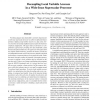Free Online Productivity Tools
i2Speak
i2Symbol
i2OCR
iTex2Img
iWeb2Print
iWeb2Shot
i2Type
iPdf2Split
iPdf2Merge
i2Bopomofo
i2Arabic
i2Style
i2Image
i2PDF
iLatex2Rtf
Sci2ools
111
click to vote
ISCA
1999
IEEE
1999
IEEE
Decoupling Local Variable Accesses in a Wide-Issue Superscalar Processor
Providing adequate data bandwidth is extremely important for a wide-issue superscalar processor to achieve its full performance potential. Adding a large number of ports to a data cache, however, becomes increasingly inefficient and can add to the hardware complexity significantly. This paper takes an alternative or complementary approach for providing more data bandwidth, called the data-decoupled architecture. The approach, with support from the compiler and/or hardware, partitions the memory stream into two independent streams early in the processor pipeline, and feeds each stream to a separate memory access queue and cache. Under this model, the paper studies the potential of decoupling memory accesses to program's local variables that are allocated on the run-time stack. Using a set of integer and floating-point programs from the SPEC95 benchmark suite, it is shown that local variable accesses constitute a large portion of all the memory references, while their reference spa...
| Added | 03 Aug 2010 |
| Updated | 03 Aug 2010 |
| Type | Conference |
| Year | 1999 |
| Where | ISCA |
| Authors | Sangyeun Cho, Pen-Chung Yew, Gyungho Lee |
Comments (0)

